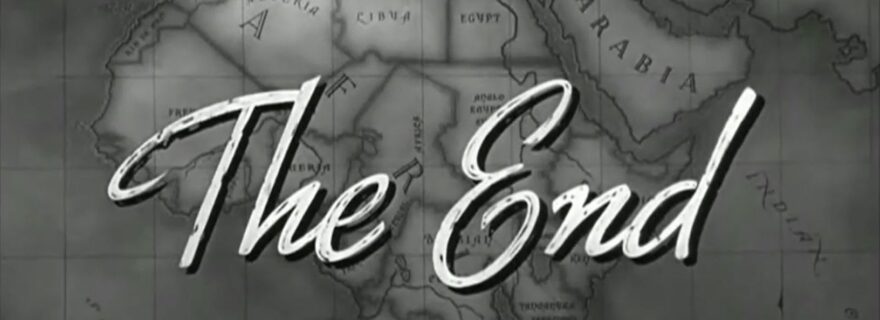It may be true that all good things must eventually come to an end, but unfortunately not all good movies end well. Some do, however! Brace yourself for some spoilers, because we’re about to give away some of our favorite movie endings.
Deirdre Crimmins
Not just my favorite ending to a film, but also my favorite final shot will forever and always be Carol Reed’s The Third Man. I suppose it’s impossible to avoid spoilers when discussing the end of a movie, but given this one is 70-years-old, I’m not too concerned. At Harry Lime’s (Orson Welles) second funeral, Holly Martins (Joseph Cotten) thinks that he’s finally going to get the girl. Though Lime is devastatingly handsome and charming, to say his death was anticipated and welcome would be an understatement. Martins’ chemistry with Lime’s lady, Anna Schmidt (Alida Valli), is palatable, and he thinks that he’s now in the clear to woo her as he has wants. As he spots her leaving the funeral, Martins hops out of his car and waits for her to make her long, slow walk to him down the cemetery driveway… and she just keeps on walking right by him without even a glance. The Third Man is not your typical noir and Schmidt is not your typical noir dame. She’s smart, resourceful, and best of all has no patience for fools and self-important admirers. I think it’s incredibly likely that I pumped my fists in the air when I first saw her epic stroll past the cocky Martins and I continue to do the same every time I watch The Third Man. You go, girl.
Jason Gorber
The glasses, the rings, the shirt, the slow drawl, the explanation of junk bonds and how the Mafia was replaced by a mob of a different kind… There are few endings more brilliant than Martin Scorsese’s masterpiece Casino.
Take all that away, and you still have the most pithy concluding lines in cinema, summing up the whirlwind events that saw murders and millions, gamblers and goons all get their world turned upside down.
So, we leave off with the last words…
…And that’s that.
David Krauss
I’m a huge film noir fan, and two of the genre’s best come from the pages of novelist James M. Cain. Double Indemnity with Barbara Stanwyck and Fred MacMurray and The Postman Always Rings Twice with Lana Turner and John Garfield are two of the steamiest and nastiest noirs Hollywood ever produced. Both employ the same premise. A sexy housewife trapped in a bad marriage to a much older man suckers a hunky, hopelessly smitten sap into helping her bump off her hated spouse so that they can collect the insurance spoils and live happily ever after in carnal and material bliss. Of course, their perfect plans go horribly awry, ending in betrayal and bloodshed. Crime wasn’t allowed to pay in those days. The stringent censorship offices that patrolled the movie industry like overzealous hall monitors made sure of that. The femme fatales always got theirs in the end, as their wicked ways came back to bite them in their proverbial behinds. Karma was a bitch, and let’s face it, so were they.
While I adored those movies – and still do – their endings always dissatisfied me. I fell hook, line, and sinker for those devious dames (I’m a sap, too), and a big part of me wanted to see them get away with their reprehensible crimes. Call me a degenerate, but I longed for a fadeout featuring a close-up of one of their faces with a piercing gaze and smug little smirk on their puss as they reveled in their evil accomplishments and set off to live the rest of their lives on their own selfish terms.
I never thought I’d see such an ending, and then, during my freshman year in college back in 1981, I bought a ticket to Body Heat, writer Lawrence Kasdan’s directorial debut and probably the finest film noir homage ever made. (Okay, maybe L.A. Confidential outshines it, but not by much.) Kasdan’s script basically rehashes Cain’s famous novels, using the same murderous pact between two flesh-hungry lovers (William Hurt and Kathleen Turner) who plot to kill the siren’s hapless husband (Richard Crenna) and share the ensuing payoff. Without the constraints of censorship, however, the film could really get down and dirty with its characters. Plenty of nudity and sex pervade this titillating thriller, as Hurt and Turner paw each other like ravenous animals before getting down to the business of murder.
Eighteen-year-old me sat transfixed in the theater, loving this no-holds-barred modern noir that took the genre where it had never gone before. Little did I know it would go even further. I prepared myself for the moment when Matty Walker (Turner) would meet her demise, and Kasdan cleverly did not disappoint me. The combustible Matty combusts in a massive explosion and Hurt goes to prison for their mutual crime. End of story.
Or was it? I still vividly remember the moment it dawned on me that Matty wasn’t dead and she was actually going to get away with her perfectly planned murder. (Actually, Matty leaves more than one body in her wake, but that’s a minor point.) Rarely in a theater have I felt such exhilaration. Finally! What I had longed to see on the screen was at last coming true! The femme fatale survives and prospers, leaving a trail of carnage in her wake… and she doesn’t bat an eye and doesn’t give a damn. She achieved the goal she wrote about in her high school yearbook and is totally at peace. Maybe there’s a tinge of regret in her stoic face as she sips a tropical cocktail on a South Sea island, but it’s only a tinge. She got what she wanted and she’s as happy as a woman like her could ever be. Fade out. I’m smiling to myself as I write this. Man, what an ending! I sailed out of that theater walking on air, as if I had just seen a buoyant comedy or musical, not a violent, vicious film noir. I loved that ending 38 years ago and I love it just as much today. Absolutely brilliant!
Brian Hoss
There are some pretty obvious things that I like in a moving ending: a great character death (Roy Batty in Blade Runner and Arthur in Excalibur are near to mind), a great character or group of characters moving on in a positive but nebulous direction (Rashomon, The Graduate), an excellent score (The Last of the Mohicans), resolution/payoff but not finality (Unforgiven), or the cinematography to stick with me without sticking out (2001, or probably Kubrick anything). With those attributes in mind, I’m choosing The Good, the Bad and the Ugly.
Back when the Alamo Drafthouse was sort of a new thing, they had a deal one Tuesday night. Come see The Good, the Bad and the Ugly and have a bowl of spaghetti with garlic bread for $5. I had never seen the movie before and thought what the hell. The results were unquestionably great. That experience may have had some effect on my affinity for the movie (and why shouldn’t it?), but that ending, no matter how well known or how saturated through the cultural consciousness, has an intensity that has yet to wane in subsequent viewings. It’s simultaneously well contained within the film’s story (a fantastic confrontation of principle characters), and entirely augmented by everything that goes into filmmaking. As the viewer, my audio and visual sensors are engaged at a perfect level of tension, not for myself, but for what the film has been building to during its patient run time. Even with such a crescendo, the movie leaves us with an afterlife, a pleasant curiosity (not a sequel tease) for what might come next.
Adam Tyner (DVDTalk)
Army of Darkness was originally intended to end on a bleak note. To be fair, happy endings were in short supply throughout the previous two films in the Evil Dead franchise as well, so Ash oversleeping for centuries and waking up in a post-apocalyptic wasteland would’ve tracked. And it would’ve been the wrong ending. See? Studio interference isn’t always a bad thing.
At the start of this third installment in the series, Ash was an insufferable prick only looking out for number one. By the end, he’d at long last taken responsibility, led the forces of good to victory (admittedly, to vanquish an evil he’d helped to unleash), and united two kingdoms in brotherhood. He’d earned an ending befitting a big damn hero. Kind of.
I mean, it’s not as if Ash, after conquering the Deadite army, rode triumphantly into the sunset with his best girl on his arm. The guy’s still a working stiff at S-Mart. But the gonzo, unapologetically over-the-top action finale that follows ranks among the movie’s most fun and exciting sequences. It’s immeasurably more in-step tonally with the preceding seventy-some-odd minutes than Plan A would’ve been. Plus, I just can’t think of a better sendoff for Ash J. Williams than holstering a shotgun, grabbing a drop-dead gorgeous bombshell, and swooping in for a hero’s kiss. Hail to the king, baby.
Chris Boylan (Big Picture Big Sound)
Casablanca – The prototypical ne’er-do-well turned hero, Humphrey Bogart’s Rick Blaine has just shot and killed a Nazi agent so that the love of his life can escape with another man. He finally puts his selfish needs aside for a higher purpose. Police Captain Louis Renault, who has witnessed the crime, looks at Blaine, then at his men and says, with a pregnant pause, “Round up the usual suspects.” Moments later as the pair walk away, the film ends with the memorable and much-quoted line (from Blaine): “Louis, I think this is the beginning of a beautiful friendship.”
The Shawshank Redemption – Though this film developed its well-earned reputation for greatness long after its release, the penultimate scene made the biggest impression on me. Unjustly convicted and imprisoned for his wife’s murder, our hero Andy Dufresne (Tim Robbins) seems to have reached his wit’s end and may be giving up on this mortal coil. But as morning comes, it’s revealed that Andy has successfully fled the coop. With this part of the tale narrated by his friend and prison mate, Red (Morgan Freeman), we learn that Andy has not only escaped, having dug a secret tunnel to freedom over the years of his incarceration, but he has absconded with the Warden’s ill-begotten fortune. Andy – a banker by trade – had been laundering the Warden’s bribes and graft through a fake account in the name of Randall Stephens. When he shows up at the bank bearing identification and details showing that he was the account’s owner, he makes a very large withdrawal. Andy had also mailed details of the warden’s crimes to a local newspaper. As the police arrive at the prison to take the warden and his top guard into custody, the warden realizes his predicament and chooses to take his own life. The final scene is also satisfying, as we see Red joining his friend on a tropical beach, to live out their days in luxury and peace.
Josh Zyber
Federico Fellini may now be regarded as the most famous Surrealist in all of cinema, but it took him seven and a half movies to get to that phase of his career. By his counting, 8 ½ was literally Fellini’s eighth and a half film. It was also his first venture into true Surrealism, and the first of his shamelessly autobiographical purgings of his own thoughts and memories and anxieties onto celluloid.
For two and a quarter hours, we follow the great Marcello Mastroianni playing a famed Italian filmmaker named Guido Anselmi, who experiences a drought of creative inspiration on the eve of his latest major production. The character is clearly a thinly-veiled surrogate for Fellini himself, and the director (the real one) treats his story as an unflinching and honest self-portrait of an artist laying bare his soul, personal flaws and all. The film doesn’t hold back from depicting his self-absorption, his philandering, or his reprehensible treatment of his wife. Every thought in Fellini’s head is projected into the character, seemingly without filtering, and the movie cuts to some deep emotional truths.
For all those dark themes, 8 ½ is somehow also a work of great joy and exuberance, of wonder and amazement, and love of life and art. This comes to a head in the film’s famous climax, in which Fellini goes full-bore with the circus motif that often fascinated him. After imagining (maybe just imagining?) himself committing suicide, other characters from Guido’s life, his memories, and his fantasies converge into a joyous circus procession, and Guido realizes that he must accept and embrace both his own faults, and those in others, in order to move past them.
Remarkably, this ending was a last-minute substitution for a more explicitly downbeat scene, and Fellini filmed it for use only in the trailer. After realizing that the new version worked much better, he destroyed the original footage. As much as I’d love to see the first draft, he made the right call . 8 ½ is a masterpiece, and its ending is the perfect closer.
Your Turn
Tell us your about favorite movie endings in the Comments.





Art A
Have to agree…the one ending etched into my movie memory more than any other…Casablanca.
cardpetree
Clicked on the article expecting to see The Mist. Was disappointed.
Josh Zyber
AuthorThat’s what the Comments are for – filling in our omissions.
Bill McClain
Illeana Douglas figure skating over Nicole Kidman’s icy grave in TO DIE FOR. Music: Donovan’s “Season of the Witch”.
Shannon Nutt
Casablanca would have been my first pick, but since it has been mentioned, I’ll go with this one:
“Forget it Jake, it’s Chinatown.”
Charles Contreras
For me, the payoff, both figuratively and literally, would be at the end of Midnight Run, when Charles Grodin’s character gives Rober DeNiro’s bounty hunter a $300,000 “gift” for finally letting him go after they arrive in Los Angeles before his midnight deadline and after their series of cross country misadventures. I love that movie, and I always look forward to that ending every time I watch it.
Dave
Agree. Great ending.
EM
Hereʼs one for Halloweentime:
“Why, she wouldnʼt even harm a fly.” <grin>
Opinionhaver
Well the ending of Escape From L.A. is pretty damn awesome, regardless of the rest of it. And another ending I always thought was excellent was Crocodile Dundee, the subway scene.
Zuria
Billy Wilder’s Some Like it Hot. Daphne/Jerry trying to convince Osgood why they can’t get married:
Jerry (exasperated) I’m a man!”
Osgood (unfazed) “Well, nobody’s perfect.”
Bolo
Too many to choose.
I’d say ‘Rosemary’s Baby’ is a film that completely hinges on sticking its landing. That final scene solidifies it perfectly.
The climactic shout fest at the end of ‘There Will Be Blood’ is also enormously entertaining.
I also love the ending to ‘Lost in Translation’. The way they awkwardly half ass their farewell at the hotel, but then Murray sees on the street and goes back in to do it right the second time.
Joshua P. Christie
Oddly enough the 1st one that jumped to my mind was Karyn Kusama’s The Invitation.
Jon
What about the final scene from Silence of the Lambs?
“I’m having an old friend for dinner…”
Barsoom Bob
I’ll go with “Let’s go home and F**k” from Eyes Wide Shut.
Robert Stokes
I’ve always been a fan of the ending of Das Boot. It was a blood chilling moment when you hit the ending after all they went through. Still gives me shivers thinking of it.
Robert Stokes
The final scene of the actual excorsim in Excorsist is pretty memorable as well.
njscorpio
“I’m gonna go home and sleep with my wife.” – Mr. Green
Dave
Good choice.
Brett
Amen to David’s pick of Body Heat. One of the all-time great MOVIES, never mind noirs. “Smiling,” “walking on air,”
“brilliant” — you describe exactly how I still feel watching this incredible movie for the umpteenth time! That ending on the beach still hits me hard. It’s oddly moving. It really leaves you inside Matty’s (Mary Ann’s) head, knowing that even though she got away scot-free, she’ll be living out the rest of her days a hollow shell. I guess this is where my interpretation of the ending and that last line-reading of hers differs from yours. I’ve always felt there was much more than a tinge of regret in her voice and expression. Yes she got what she wanted but at a huge price to her soul (such as it was). That’s what gives the ending such power for me. For all her icy resolve and brilliant scheming, in the end she’s been left a broken woman. Be careful what you wish for….. DAMN what an ending!
However, I had to skip over the first section of your post as I STILL haven’t broken in my copy of the original Postman. I was thinking just recently how I urgently need to put this in my to-watch queue.
David Krauss
I loved reading your comment, Brett! It’s really hard to read her cryptic face at the end, which is another reason why the ending is so brilliant. It’s definitely a “be careful what you wish for…” type of ending. Part of me wonders whether she’s an empty shell merely because she has achieved her goal, so what’s left in her life? I think even she knows cocktails on the beach will get old pretty quickly. I don’t think she’s capable of love, so I don’t think she really misses Ned, but she might miss the game, the thrills, all of that. Do you think she feels any guilt? I don’t know… Sociopaths usually don’t.
You gotta watch Postman! I’d love to hear your thoughts on that. I think it’s one of Lana Turner’s best performances and John Garfield is always super good.
Brett
Very interesting, David! All these years of watching BH and that had never occurred to me. My reading’s always been that her last comments to Ned at the boathouse were basically sincere, that in the end that not-very-bright Ned fella had somehow gotten under her skin, and that as she sat on that beach she was lamenting having ruined a man she’d actually come to feel something for. Guilt? Hmmm, that’s a tough call. Maybe just a little. There’s definitely a despondency in her face in that last scene. My feeling is that Ned is very much on her mind. But then maybe I’m giving a sociopath too much credit…..
It’s settled then — Postman goes on my weekend viewing. And all this Body Heat talk makes me realize that I’m due for a revisit. I’ll definitely be watching that ending in a different light this time. We’ll see…..
Going back to Double Indemnity – It’s only since the dawn of the Blu-ray age that I’ve gone back and discovered many Golden Age classics, Double Indemnity being one that I’ve only just seen in the past year or so (yes, shameful I know). Watching it for the first time after decades of being a Body Heat addict, it was fascinating seeing just how much Kasdan lifted from Wilder and Chandler. There was a part of my brain going, “Look how much they copied Body Heat!” Much the same way I’m sure some young, modern-day Star Wars fans watch A New Hope for the first time and go, “But they totally copied Force Awakens!” It felt like I was watching a movie I’d already seen. I wanted to yell at the screen, “No, Walter! Walk away! Look what happened to Ned!” Amazing how two movies almost 40 years removed could share so much DNA while being so wonderfully unique and enjoyable in their own ways.
David Krauss
Brett, I like your reading of the scene as well. And you are making me want to go back and watch BH again, too!! 🙂
Yeah, the similarities between Body Heat and Double Indemnity are almost too numerous to mention, but Kasdan makes Body Heat just different enough to make it unique. You know how you think that Matty really has feelings for Ned, despite all she’s done to him? How do you feel about Phyllis and Walter? In that terrific last scene of Double Indemnity, Phyllis suddenly professes her love for Walter. She says she didn’t realize it until she shot him and was in danger of losing him. She says she knows she’s rotten to the core, but she still loves him and she wants him to hold her close. Is she sincere? Or does she know she’s cornered and this is her last desperate manipulation of Walter, a phony display of vulnerability so she can reclaim the upper hand and finish him off? I’m not sure. Stanwyck is such a good actress, I buy her confession of love. I want to believe that there’s at least a shred of goodness in her. But if I were in Walter’s shoes, would I believe her? I don’t think so. At least I don’t think I’d take the risk and be even more of a sap than I’ve already been. I just love how Walter reacts. The way he delivers the line, “Bye-bye, baby,” is just so perfect!
Now, if Ned and Matty were playing out the same scene, I think Ned would give in to Matty. (He’s not as tough as Walter.) He wouldn’t say “bye-bye, baby,” he’d say, “I love you , too,” drop the gun, and kiss her. And then she’d pick the gun up, tell him again that she loves him, tell him again that he’s “not so bright,” and pump him full of lead!
What do you think?
Brett
Haha! Interesting scenario. I really need a refresher on that ending as I’ve been meaning to re-watch DI ever since my first viewing (I feel a noir triple feature coming on), but I recall taking Phyllis at her word also. Yes Walter’s reaction is most satisfying.
I don’t doubt for a moment that Ned would react the way you say. But would Matty finally put poor, hapless, gullible Ned out of his misery? Tough call. A part of me wishes she wouldn’t, because as you say I want to believe there’s a shred of goodness in her, even more so than with Phyllis. Or maybe like Ned I’m just a sucker for a good femme fatale. One thing I can say for certain is that if she did pull that trigger, there’d be one VERY morose woman lounging on that beach at the end, leaving very little room for interpretation…..